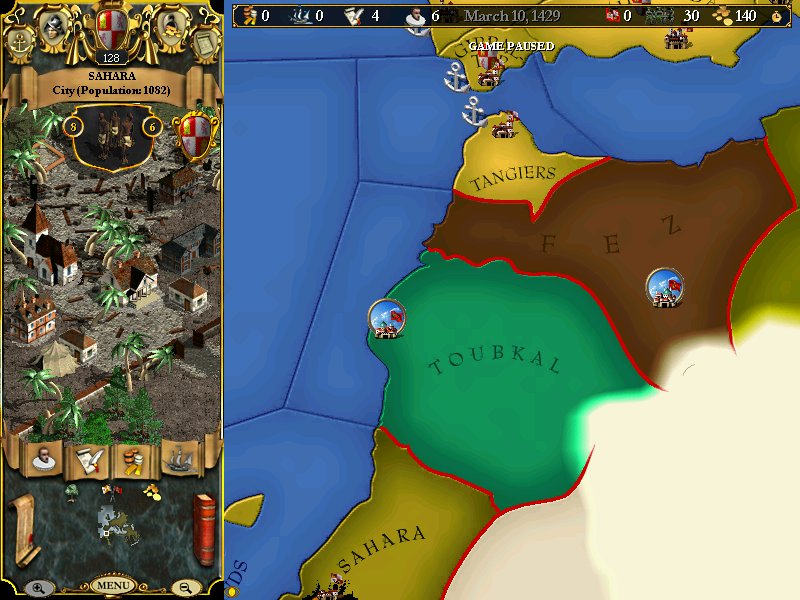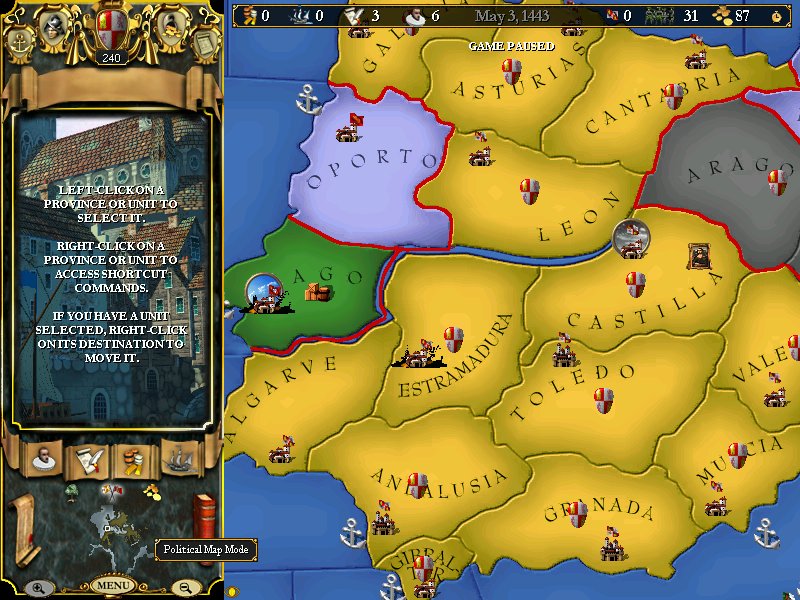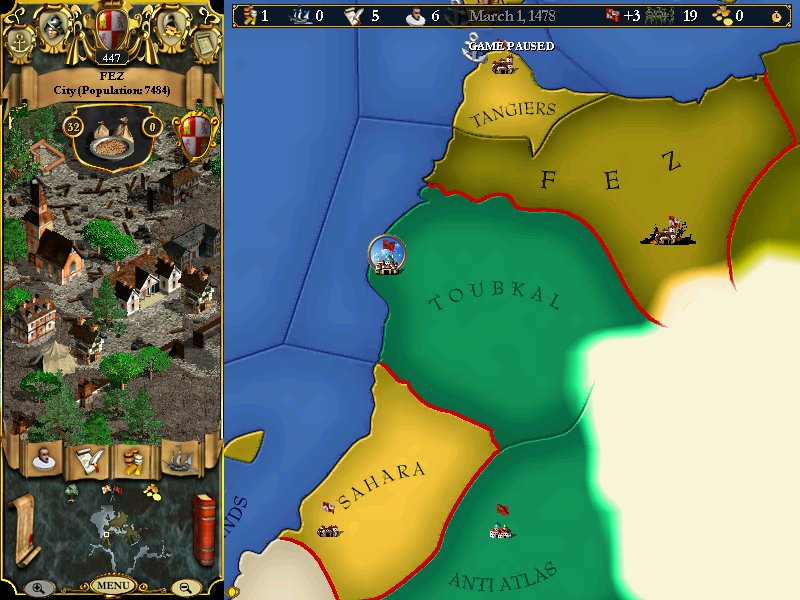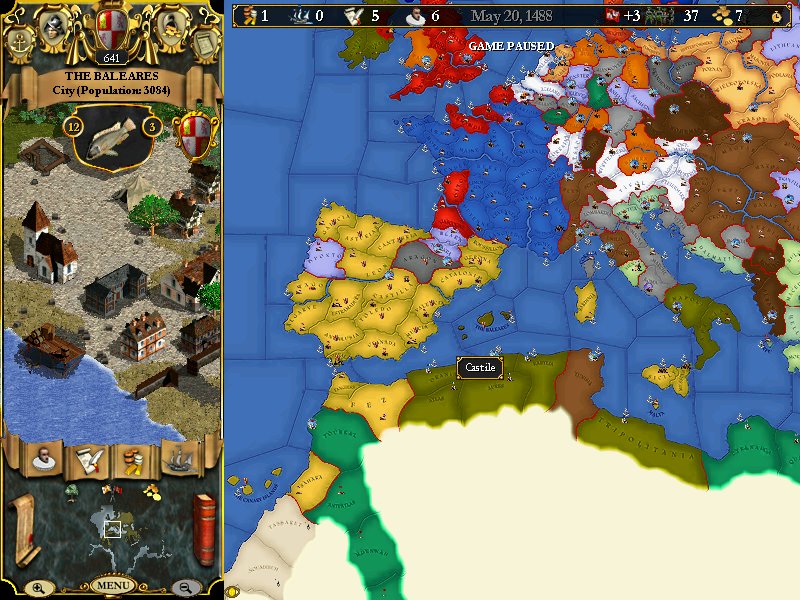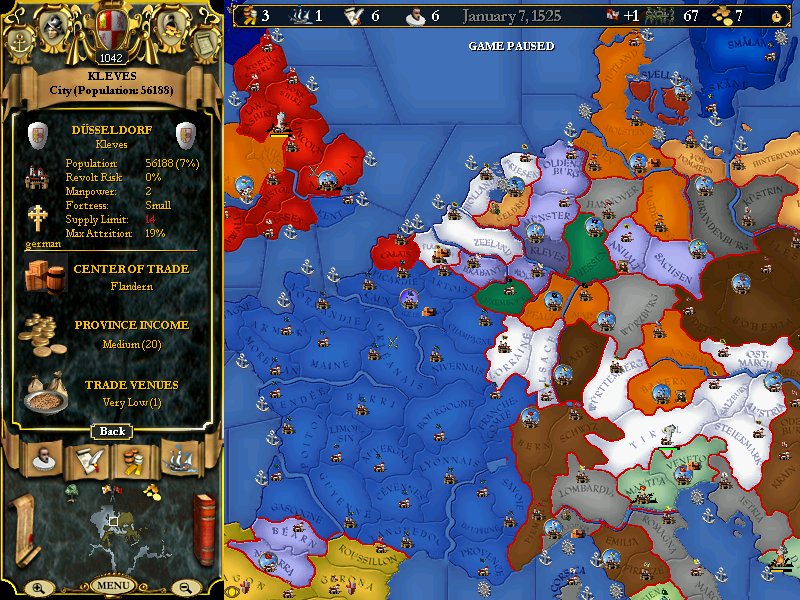Burgundy at peace
The money from the war is used to promote tax collectors and to build a larger fortress in Bourgogne.
In September, royal marriages are given to Siena an Pommern.
In January, 1428, royal marriages are arranged with Bremen and Orleanais. Tax Collectors are promoted in Champagne.
In march, a royal marriage is conducted with Mecklemburg.
In January, 1429, Phillip decides to change domestic policy, and shifts in the direction of quality. He wants to make the army of Burgundy the mightiest in Europe. Royal marriages are arranged with Hungary, Poland, Lithuania, and the Teutonic Order of Livonian Knights.
Also, upgrades begin in Artois to the fortifications there.
In February, the fortress in Franche-comte is upgraded by the serfs there, much to the join of Phillip.
In July, royal marriages are obtained with Transylvania, Muscovy, and Ryzan.
In November, the duchy of Brabant is asked to join the alliance Burgundy has with England. They accept.
As of January, 1430, Phillip sends a state gift to Brittany to help them fight France. Brittany is very impressed, and they no longer hate Burgundy. Merchants are sent out as well, to try and increase trade.
In April, good government polices are evident in Phillips reign.
In May, a royal marriage is conducted with Denmark.
In August, the Succession in Brabant occurs, giving Phillip control of Brabant. Brbant is now a vassal of Burgundy.
In October, royal marriages are conducted with Sweden and Holstein.
By January, 1431, Phillip sends Brittany another state gift. They receive it very well, and consider themselves the best of friends with Burgundy now. Merchants are sent to Genoa.
In February, despite their friendship with Burgundy, they refuse to join the alliance. Phillip plans to get at least military access from them.
In April, Brittany gives military access to Burgundy.
In May, a royal marriage is arranged with Naples.
In July, Baden has proved themselves on the battlefield. They have militarily vassalized Helvetia. Phillip grows concerned about his "German Flank" as he calls it now.
In September, royal marriages are arranged with Athens and Cyprus.
In October, Phillip enters into a royal marriage with the Eastern Roman Empire. His family has now mingled with the last descendants of Roman emperors.
In January, 1432, News reaches Phillip that England has been struck by civil war. He sends Henry VI a personal gift, making England the closest friend of Burgundy. He hopes they solve the problem quickly, or war with France may be the result. More merchants are sent out.
In February, a royal marriage is given to the orthodox peoples of Suzdal.
In April, Phillip offers England the status of vassal, but they decline.
By September, Phillip's reputation has grown, and several neighbors have better relations with Burgundy.
In January, 1433, Phillip notes that Burgundy still has a tarnished reputation due to the annexation of Lorraine and the offensive war with France. He will continue to lay low and conduct diplomacy while building his strength. In particular, he wishes to upgrade all fortifications up to new standards. He orders the fortifications in Alsace to be improved.
Yes, you have a question? Why does Phillip refrain for conquering France? Were he here, I'm sure he would give a wonderful explanation why. But mine will have to suffice. If he did so, and I will note that he could have very easily done so, but it would do his country no good to gain France, only to lose everything in a war with the rest of Europe. And therein lies an important lesson for you to learn.
In January, 1434, trade agreements are struck with Brittany and Brabant. Merchants are sent abroad. The next fortification project will be Lorraine.
In March, Brittany finally solves it problems with France, signing a white peace. Once this is done, Phillip issues a guarantee of their independence. Should anyone go to war with Brittany, Burgundy will gain the right to intervene.
In June, merchants have been harassed by Mainz. Phillip chooses to diplomatically resolve the issue, improving relations with Mainz.
In January, 1435, Gascgone secedes from England in southern France, proclaiming themselves Guyenne. England asks for Phillips help, and he accepts. There is no practical way to get troops to the area, but Phillip issues his sympathy declaration of war.
Upgrades begin to fortifications in Lorraine.
In February, Aragon annexes Modena by force of arms. This prompts a general war in Italy and in Iberia, as both the Pope and Spain declare war on Aragon, dragging their allies into the war. This general war has tied up France and her vassals, which gives Phillip no end of joy.
Throughout 1436 and 1437, upgrades begin on the fortifications in Flandern. It is a long, slow process upgrading fortifications, but one that Phillip feels is worth it.
In July, a royal marriage is arranged with Saxony.
In October, Phillip signs a white peace with Guyenne, as he waits for England to re-annex them.
In January, 1438, fortress upgrades begin in Zeeland. Things are quiet for Burgundy, as Phillip tries to rebuild its reputation.
In September, unhappiness is reported among the merchants. Trade research has suffered.
January, 1439: Phillip changes his domestic policy. He makes the military more offensive in its doctrine. He also begins upgrades to fortifications in Holland. Burgundy's reputation has improved, but it is still slightly tarnished. Phillip hopes it will continue to improve.
In February, France's alliance declares war on Gelre and Cyprus. Considering Gelre is in close to Holland, Phillip takes a great interest in the war.
By January, 1440, there is very little action between Gelre and France's vassals. Phillip grows less concerned. He continues saving for the fortress upgrades needed in Nivernais and Champagne.
In June, France's vassals make peace with Cyprus, ending the threat of Gelre being annexed by France or one of her vassals. Phillip now begins to plot to annex them himself. He has casus belli because of his claims in those lands, but he shares a royal marriage with Gelre. For the moment, he will build up his strength, waiting for the time to strike.
In July, indulgences are being sold at high volume in Holland, hurting the economy there.
In August, Orleans reestablishes their vassalship with France.
In December, Bavaria, the newest super-power in the Holy Roman Empire, gets involved in another war. They are generally loathed by their fellow Germanic states. Phillip sees an opportunity. Should the war drag out, Phillip may begin subsidizing Bavaria to make them more friendly.
January, 1441: January is a busy month. Venice peacefully annexes Bosnia. Castile peacefully annexes Navarre. And the peasants of Nivernais rise in revolt, seizing the garrison in the province. Phillip leads the army to deal with them. Fortifications in Champagne begin to be upgraded. Also, Raguse declines a royal marriage. Phillip is not happy.
By February, Nivernais is under siege.
By November, Phillip has crushed the revolt.
In January, 1442, the fortifications in Nivernais are now being upgraded. The fortification project is now complete. Phillip begins to consider rebuilding the field army and to begin giving Bavaria subsidies. Also in January, Aragon peacefully annexes Naples.
In August, a merchants donates 5 ships to the navy, and Phillip eagerly has them converted into warships.
In September, the hated French peacefully annex Provence into their kingdom. France grows stronger.
In November, Poland peacefully annexes Brandenburg.
In 1443 and 1444, Phillip raises several thousand infantry and cavalry to support the army
In February, Vienna falls to Bavaria. Austria has no provinces left, and Phillip awaits news of their final capitulation. Bavaria will become hated for a victory in this war, but she will be very strong.
In April, Austria signs a humiliating peace with Bavaria and Hungary. Austria cedes Tyrol to Bavaria, Steiriemark to Hungary, and gives up military access to both countries. Austria is now a one province insignificant power.
See this tapestry lad? Look at tiny Austria. This is the fate of weak countries in the world. But, also bear in mind that even weak countries may rise up from the ashes.
In May, an unprovoked revolt occurs in the capitol. Phillip marches to crush the peasants.
In June, he is successful.
In November, Gelre elects to continue its alliance with Cyprus. Phillip notes that his marriage with them will end soon. He positions the army in Holland, gathers more men, and prepares for war.
In December, Serbia annexes the Ottoman Empire. The Balkans are a big mess, with the rotting corpse of Byzantium still thriving. Phillip is amazed no one has taken power in the area.
A question? Who were the Ottomans? Well, you can't see them on this tapestry, because they were annexed. But they are a good example of great potential never realized. They should have ended the existence of the Byzantine Roman Empire, but never achieved it. Think of how different history might have been!
In January, 1445, in March, the royal marriage with Gelre will expire. Phillip will be ready for war if France does not declare war first. The only problem now is that Friesland has signed on to the alliance with Gelre. Assuming Phillip can defeat their combined armies, he may be able to crush them both.
In April, the final cavalry reinforcements are recieved. Phillip moves to Zeeland, and prepares to declare war. By sitting across the Rhine, he hopes to tempt their armies to advance across, or to leave themselves open by invading Holland.
In May, a royal marriage is given to England.
Then, on May 9th, Phillip declares war.


